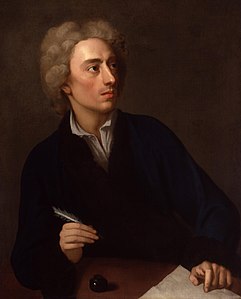Analysis of Chorus of Youths and Virgins
Alexander Pope 1688 (London) – 1744 (Twickenham)
Semichorus.
Oh Tyrant Love! hast thou possest
The prudent, learn'd, and virtuous breast?
Wisdom and wit in vain reclaim,
And Arts but soften us to feel thy flame.
Love, soft intruder, enters here,
But ent'ring learns to be sincere.
Marcus with blushes owns he loves,
And Brutus tenderly reproves.
Why, Virtue, dost thou blame desire,
Which Nature has imprest?
Why, Nature, dost thou soonest fire
The mild and gen'rous breast?
Chorus.
Love's purer flames the Gods approve;
The Gods and Brutus bent to love:
Brutus for absent Portia sighs,
And sterner Cassius melts at Junia's eyes.
What is loose love? a transient gust,
Spent in a sudden storm of lust,
A vapour fed from wild desire,
A wand'ring, self-consuming fire,
But Hymen's kinder flames unite;
And burn for ever one;
Chaste as cold Cynthia's virgin light,
Productive as the Sun.
Semichorus.
Oh source of ev'ry social tie,
United wish, and mutual joy!
What various joys on one attend,
As son, as father, brother husband, friend?
Whether his hoary sire he spies,
While thousand grateful thoughts arise;
Or meets his spouse's fonder eye;
Or views his smiling progeny;
What tender passions take their turns,
What home-felt raptures move?
His heart now melts, now leaps, now burns,
With rev'rence, hope, and love.
Chorus.
Hence guilty joys, distastes, surmises,
Hence false tears, deceits, disguises,
Dangers, doubts, delays, surprises;
Fires that scorch, yet dare not shine
Purest love's unwasting treasure,
Constant faith, fair hope, long leisure,
Days of ease, and nights of pleasure;
Sacred Hymen! these are thine.
| Scheme | Abbccxxaadbdb Aefaabbddbgbg Abxbbaaxxaeaf Aaaahdddh |
|---|---|
| Poetic Form | |
| Metre | 1 1101111 010101001 10010101 0111011111 11010101 11111101 10110111 0101001 110111010 11011 110111010 01011 10 11010101 01010111 10110101 01011111 11110101 10010111 01111010 011101010 111011 011101 111100101 010101 1 1111101 010101001 110011101 1111010101 101101011 11010101 11110101 11110100 11010111 11111 11111111 11101 10 11011010 11101010 10101010 10111111 101110 10111110 11101110 1010111 |
| Closest metre | Iambic tetrameter |
| Characters | 1,532 |
| Words | 256 |
| Sentences | 21 |
| Stanzas | 4 |
| Stanza Lengths | 13, 13, 13, 9 |
| Lines Amount | 48 |
| Letters per line (avg) | 26 |
| Words per line (avg) | 5 |
| Letters per stanza (avg) | 307 |
| Words per stanza (avg) | 64 |
Font size:
Submitted on May 13, 2011
Modified on March 05, 2023
- 1:20 min read
- 97 Views
Citation
Use the citation below to add this poem analysis to your bibliography:
Style:MLAChicagoAPA
"Chorus of Youths and Virgins" Poetry.com. STANDS4 LLC, 2024. Web. 29 Apr. 2024. <https://www.poetry.com/poem-analysis/455/chorus-of-youths-and-virgins>.


Discuss this Alexander Pope poem analysis with the community:
Report Comment
We're doing our best to make sure our content is useful, accurate and safe.
If by any chance you spot an inappropriate comment while navigating through our website please use this form to let us know, and we'll take care of it shortly.
Attachment
You need to be logged in to favorite.
Log In